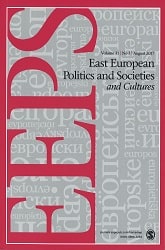Globalization and Its Discontents: Notes on Polish Studies in an Age of Globalization
Globalization and Its Discontents: Notes on Polish Studies in an Age of Globalization
Author(s): Joanna NižyńskaSubject(s): Comparative Study of Literature, Culture and social structure , Higher Education , Sociology of Culture, Globalization, Sociology of Education
Published by: SAGE Publications Ltd
Keywords: globalization; Polish studies; Eastern Europe; East European studies;
Summary/Abstract: The article focuses on the challenges facing “East European Studies” in the globalizing Western academia. Niżyńska discusses major globalizing tendencies in the academic discourse, particularly in Comparative Literature, and the opportunities they present for the scholarship on cultures previously academically underprivileged. She suggests that scholarship on East European literatures and cultures has made insufficient use of such opportunities to generate research that combines the specialized knowledge of the regions with methodological reflection able to cross-pollinate other fields. The reasons for this status quo may lie in the very labels “East European Studies” and “Eastern Europe” under which the field has been circulating in Western academia. Because they cluster and homogenize different European cultures, these labels present an anachronistic view of the regions(s) associated mainly with Communism and the Cold War and perpetuate intellectual preconceptions in Western academia, hindering the development of new interpretative vocabularies. Although anachronistic, these labels were productive in a Foucauldian sense, at once generating and limiting the field’s institutional identity. As the geopolitical transformations of the post-1989 era reconfigured European maps, they compelled a need for East European studies’ self-adjustment and a change in the field’s public image. Instead of seeking new labels, Niżyńska proposes keeping the existing labels as heuristic devices serving the field’s institutional objectives while acknowledging the need for ongoing resignification of their anachronistic character. Niżyńska suggests “queering East European Studies”—performing a maneuver similar to that of Queer Studies, where the label of exclusion has been reclaimed as one of self-assertion and empowerment.
Journal: East European Politics and Societies
- Issue Year: 28/2014
- Issue No: 04
- Page Range: 678-686
- Page Count: 9
- Language: English
- Content File-PDF

